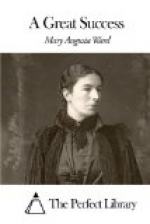Yours gratefully,
HERBERT DUNSTABLE.
Lady Dunstable crushed the letter in her hand. All pretence of incredulity was gone. She began to walk stormily up and down. Doris sank back in her chair, watching her, conscious of the most strangely mingled feelings, a touch of womanish triumph indeed, a pleasing sense of retribution, but, welling up through it, something profound and tender. If he should ever write such a letter to a stranger, while his mother was alive!
Lady Dunstable stopped.
“What chance is there of saving my son?” she said, peremptorily. “You will, of course, tell us all you know. Lord Dunstable must go to town at once.” She touched an electric bell beside her.
“Oh no!” cried Doris, springing up. “He mustn’t go, please, until we have some more information. Miss Wigram is coming—this afternoon.”
Rachel Dunstable stood stupefied—with her hand on the bell.
“Miss Wigram—coming.”
“Don’t you see?” cried Doris. “She was to spend all yesterday afternoon and evening in seeing two or three people—people who know. There is a friend of my uncle’s—an artist—who saw a great deal of Miss Flink, and got to know a lot about her. Of course he may not have been willing to say anything, but I think he probably would—he was so mad with her for a trick she played him in the middle of a big piece of work. And if he was able to put us on any useful track, then Miss Wigram was to come up here straight, and tell you everything she could. But I thought there would have been a telegram—from her—” Her voice dropped on a note of disappointment.
There was a knock at the door. The butler entered, and at the same moment the luncheon gong echoed through the house.
“Tell Miss Field not to wait luncheon for me,” said Lady Dunstable sharply. “And, Ferris, I want his lordship’s things packed at once, for London. Don’t say anything to him at present, but in ten minutes’ time just manage to tell him quietly that I should like to see him here. You understand—I don’t want any fuss made. Tell Miss Field that Mrs. Meadows is too tired to come in to luncheon, and that I will come in presently.”
The butler, who had the aspect of a don or a bishop, said “Yes, my lady,” in that dry tone which implied that for twenty years the house of Dunstable had been built upon himself, as its rock, and he was not going to fail it now. He vanished, with just one lightning turn of the eyes towards the little lady in the blue linen dress; and Lady Dunstable resumed her walk, sunk in flushed meditation. She seemed to have forgotten Doris, when she heard an exclamation:—




